Key takeaways:
- Timing is crucial; overloading practice schedules can lead to burnout and hinder performance.
- Effective communication within the dance community is essential to prevent scheduling conflicts and ensure full participation.
- Flexibility in scheduling fosters creativity and enhances the overall practice experience.
- Personal experiences highlight the importance of managing commitments and logistics to avoid missed opportunities.
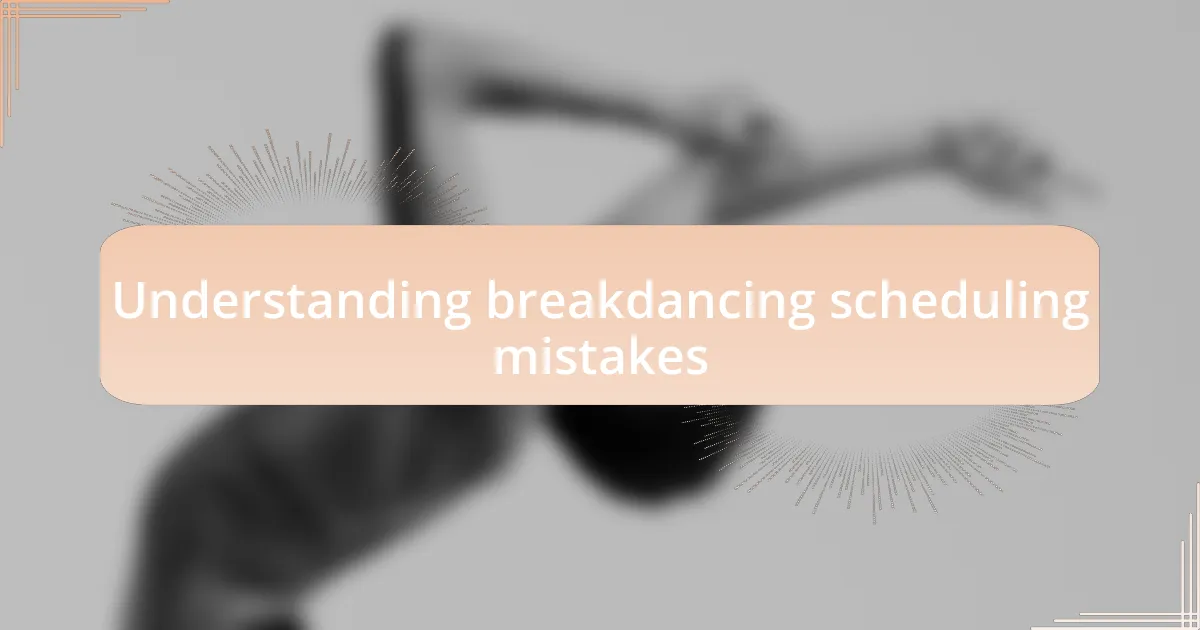
Understanding breakdancing scheduling mistakes
One critical aspect of understanding scheduling mistakes in breakdancing is recognizing the importance of timing. I vividly remember a time when I booked a practice session right before a major competition. The clash of nerves and fatigue left me feeling unprepared, which I realize now could have been avoided with a more thoughtful approach to timing.
Have you ever tried to juggle too many sessions in one week? I certainly have, and it can lead to burnout rather quickly. When I overloaded my schedule, I found that not only was my energy depleted, but my creativity also took a hit. Balance is essential; understanding when to rest versus when to push yourself can dramatically affect performance.
Finally, let’s not forget about communication. There was a time when I assumed everyone was on the same page about our group practice schedule, only to find out that some crew members had different commitments. This misunderstanding created tension and frustration. Reflecting on these experiences has made me realize how vital it is to establish clear communication channels to prevent future scheduling mishaps.
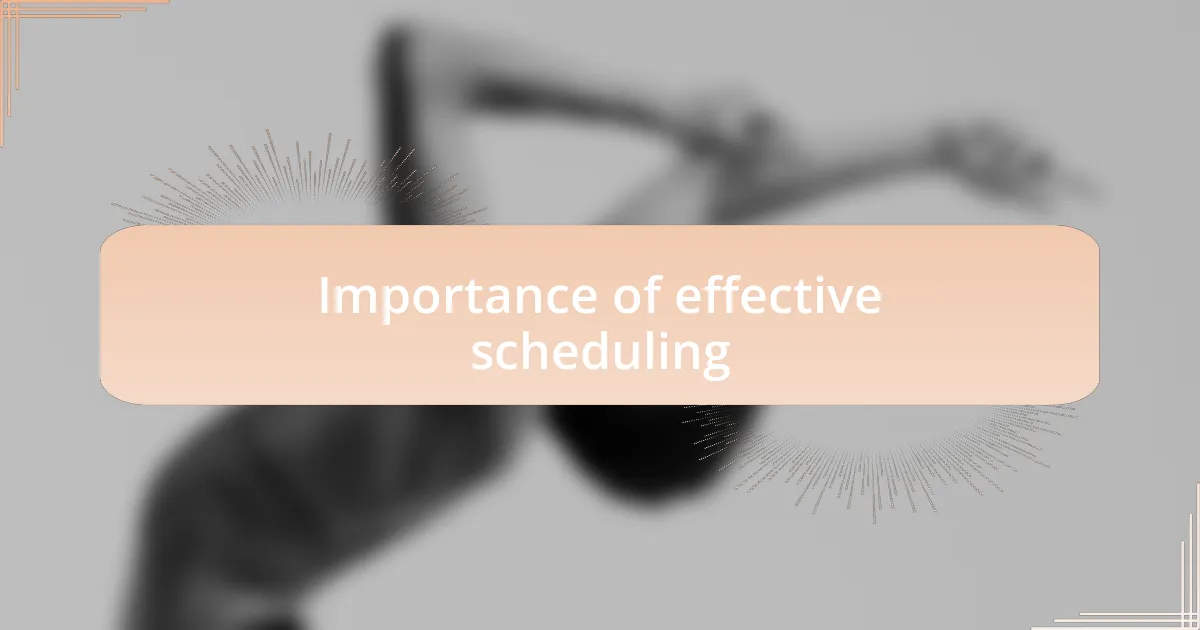
Importance of effective scheduling
Effective scheduling is crucial for maximizing our potential in breakdancing. I remember a time when I confidently planned a series of intensive workshops in one week, thinking I could handle it all. By the end of that week, I was not only physically worn out but also emotionally drained, questioning my passion for dance. That experience helped me see that humane pacing is not just a suggestion; it’s a necessity for sustained growth.
I often think about how we allocate our time and energy. For instance, there was a month where I meticulously organized my practices, carving out slots for recovery and reflection. The difference was astounding; instead of feeling rushed and frustrated, I found joy in my progress. Have you ever experienced that moment when everything clicks? That’s the power of thoughtful scheduling—it allows creativity to flourish while ensuring we remain energized and motivated.
Avoiding conflicts is another pivotal reason for effective scheduling. I once planned a jam session on the same day as a popular local event. To my surprise, very few showed up. It was disheartening, but it taught me the necessity of considering external factors and the community’s pulse. Scheduling isn’t just about fitting in practices; it’s about harmonizing with the dance community and creating an atmosphere where everyone can thrive. How often do we overlook these connections in our routines?
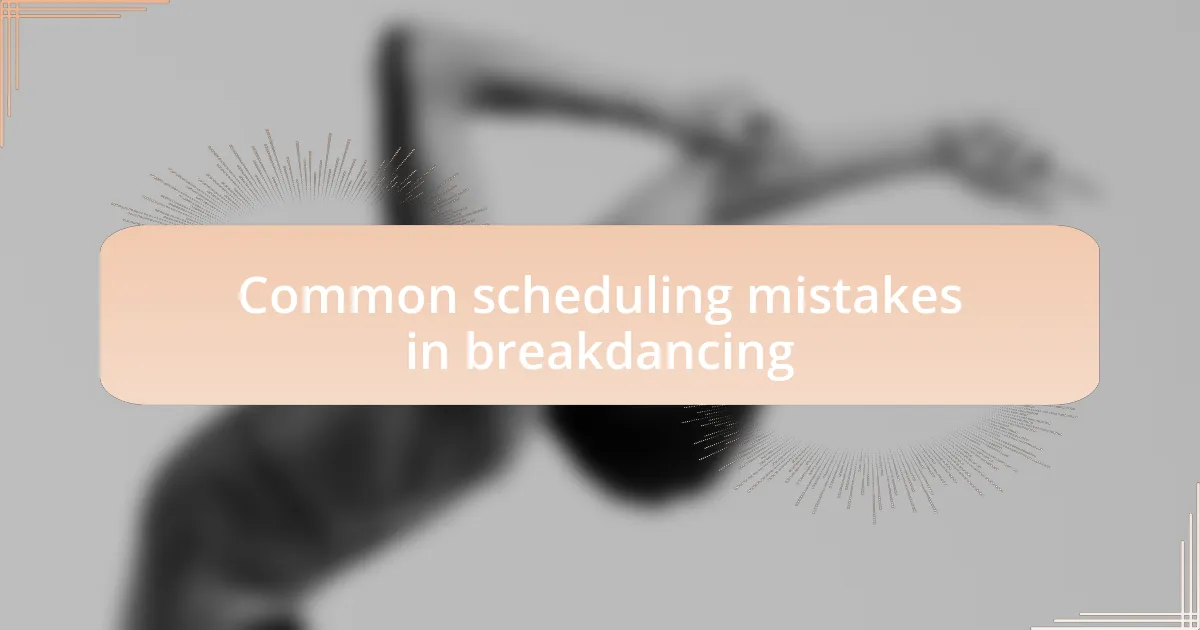
Common scheduling mistakes in breakdancing
One common mistake in scheduling is underestimating the time needed for preparation and recovery. I vividly recall a weekend where I planned to participate in a dance battle straight after a rigorous training session. By the time I hit the floor, my body was screaming for rest, and instead of showcasing my skills, I felt off-balance and sluggish. Have you ever pushed your limits, thinking you could muscle through? That experience taught me that rest is an essential component of training—without it, we risk diminishing our potential.
Another frequent pitfall is neglecting to communicate within the dance community. During one summer, I organized a group practice without consulting my crew about their availability. It turned out many had prior commitments, and only a few showed up. I felt frustrated, realizing how my lack of communication created a disconnect. Isn’t it vital that we check in with each other to ensure our schedules align? By simply reaching out, I could have forged a stronger bond and made the practice more productive for everyone involved.
Lastly, many of us fall into the trap of rigid scheduling that leaves no room for spontaneity. I once crafted a week-long training plan, leaving no time for freestyle or improvisation. After a few days, I felt confined, as though I was following a script rather than expressing myself through movement. Can you relate to that feeling of being boxed in? I learned that while structure is important, allowing flexibility fosters creativity and keeps our passion alive. Embracing the unexpected can lead to some of the most rewarding dance experiences.
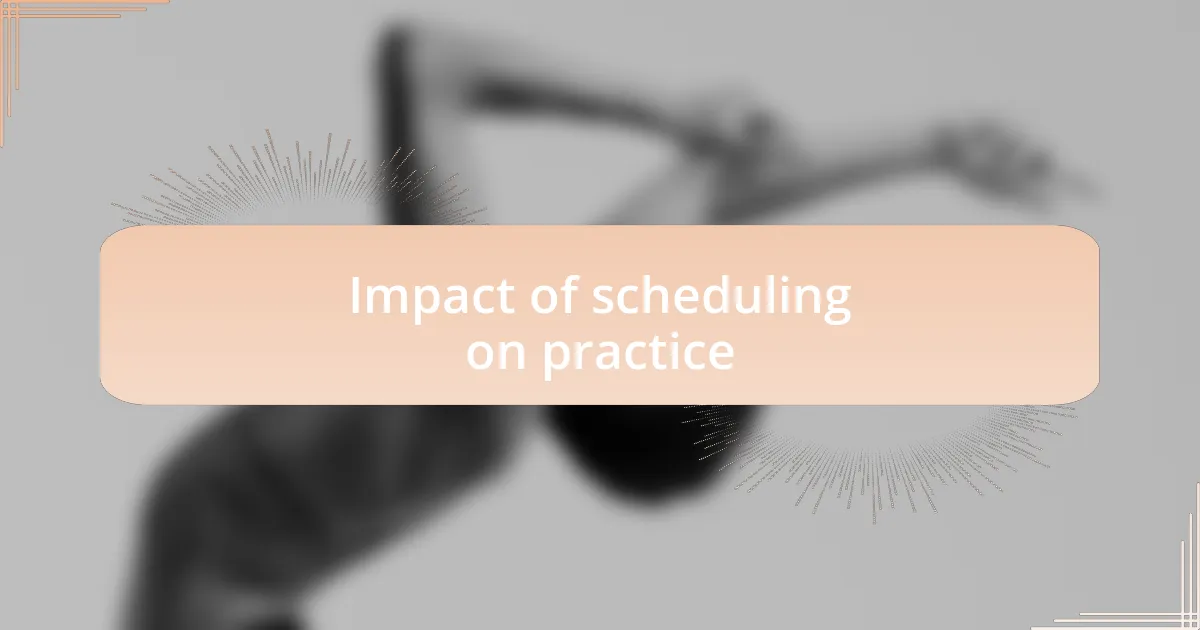
Impact of scheduling on practice
Finding the right balance in scheduling can greatly influence our practice sessions. I remember a time when I was so eager to improve that I booked back-to-back practices, thinking more was better. Instead of feeling more skilled, I found myself frustrated and drained, struggling to execute even the simplest moves. Have you ever felt like you were going through the motions without making real progress? I realized then that quality time spent practicing is far more beneficial than simply clocking hours.
Another challenge I faced was failing to account for external factors that might impact practice. I set a practice session during a holiday, only to discover that half my crew was out of town, leaving me to train solo. It was a bittersweet experience—great for personal focus but devoid of the energy that comes from dancing with friends. I discovered that our collective spirit fuels our growth. Have you experienced that magic when dancing together? It’s important to consider the motivation and camaraderie that come from practicing as a community.
Lastly, I learned that setting too rigid a schedule can stifle our passion. I once followed a strict timeline for a competition, making every practice feel like a chore rather than a joy. The pressure became overwhelming, and I found myself dreading the sessions I once loved. Has that ever happened to you, where structure turns into stress? This taught me the value of blending structured practice with moments of free expression, as they rejuvenate our love for breakdancing and keep our creativity alive.
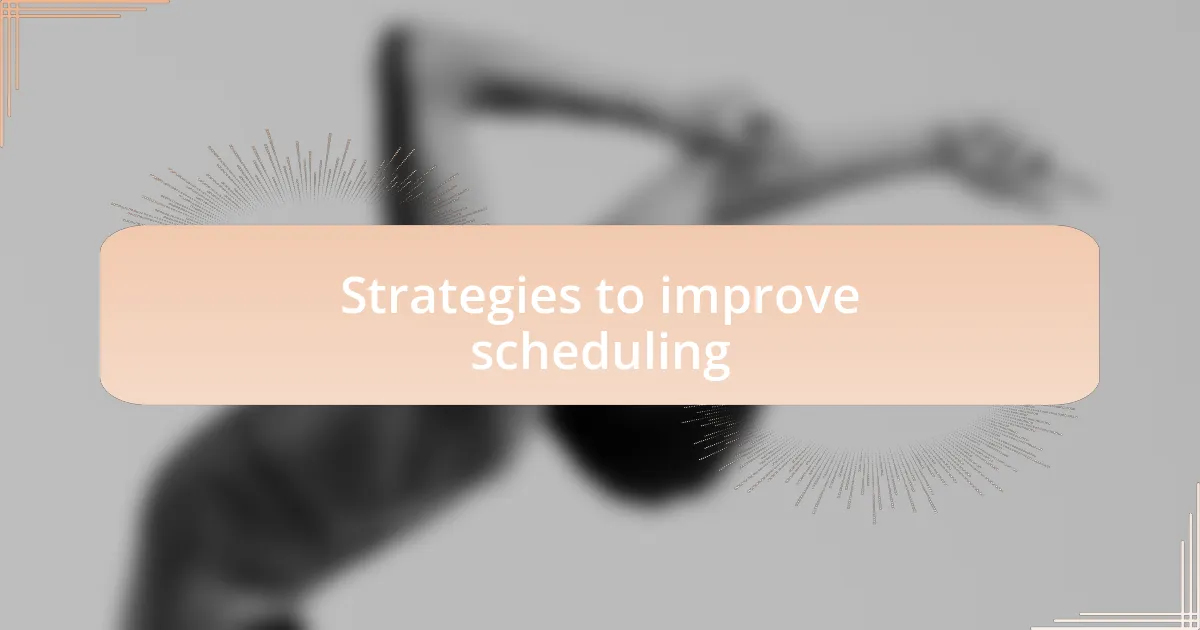
Strategies to improve scheduling
When it comes to improving our scheduling, I’ve found that keeping a flexible mindset is crucial. I once tried adhering to a strict weekly timetable, which ended up feeling more like a burden than a beneficial strategy. Taking a step back, I learned that allowing for spontaneous jam sessions or last-minute practices can lead to unexpected breakthroughs. Have you ever had a moment of inspiration strike right when you least expected it?
Another effective strategy is to involve the entire crew in the scheduling process. I remember organizing a group meeting to discuss our preferred practice times. The result was amazing—we not only discovered that certain members thrived in morning sessions, while others preferred evenings, but we also strengthened our team bond. Isn’t it empowering when everyone feels heard and valued? Coordinating with each member fosters a sense of ownership, making us more committed to our joint practices.
I’ve also discovered that setting specific goals for each practice session can enhance our focus and productivity. One day, I walked in with a mission to nail a complex freeze, and it transformed my mentality. Instead of just going through the motions, I had direction and purpose. Do you have something in particular you want to master? By defining our objectives beforehand, we can maximize our time on the floor and ensure that every session counts.
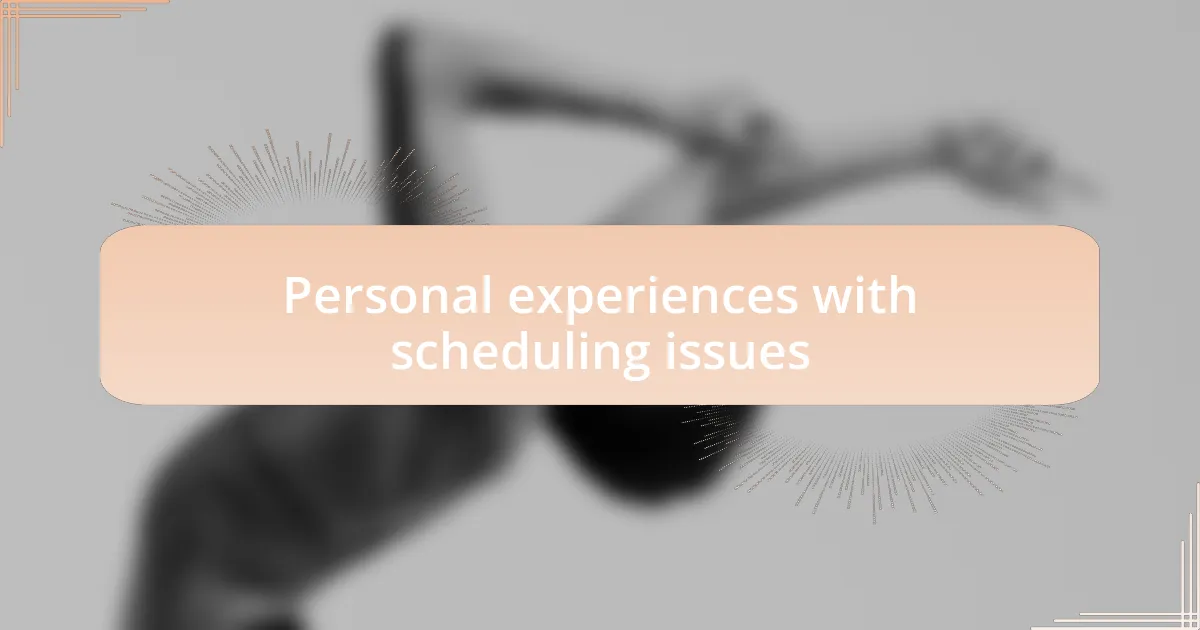
Personal experiences with scheduling issues
I remember a time when I double-booked myself for a practice and a community event. The anxiety was real—I didn’t want to let either group down. This experience taught me the importance of using a reliable calendar tool. Have any of you felt torn between commitments? It’s moments like these that make you appreciate the need for clarity in scheduling.
There was another incident when I completely overlooked a major competition because I didn’t account for travel time. The regret hit hard. Looking back, it was a wake-up call that helped me realize how crucial it is to plan not just for practice time but also for the logistics surrounding our performances. How many of us have learned lessons the hard way in this regard?
One memorable situation involved a jam session that was set for a Wednesday night but had to be rescheduled multiple times due to conflicts. It frustrated me at first, but eventually, I found it led to a stronger connection with my crew. We bonded during the back-and-forth conversations, and I realized that flexibility in scheduling could create opportunities for deeper relationships. Have you ever turned a scheduling headache into something positive? That experience certainly shaped my approach moving forward.
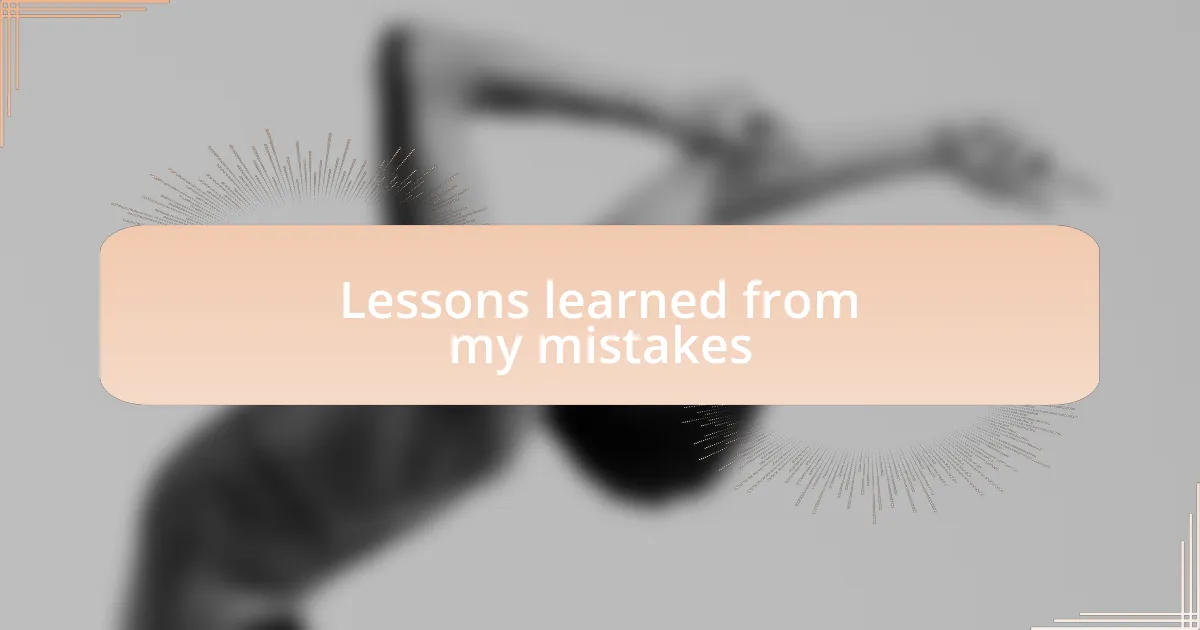
Lessons learned from my mistakes
One significant lesson I learned occurred during a battle where I miscalculated my practice time and arrived late. The disappointment of missing my cue was palpable. It hit me hard that timing is everything in our world; understanding how to allocate time effectively can set the tone for success. Have you ever faced a moment where poor timing cost you dearly?
In another instance, I committed to too many workshops in one week, thinking I could manage it all. The burnout that followed was overwhelming. I found that spreading myself too thin not only affected my energy but also my passion for breakdancing. Have you ever tried to do too much at once and felt that it took away from what you truly love?
I also remember the time I overlooked a small but crucial meeting about an upcoming event. Missing that meeting led to confusion about our routines. This experience reminded me of the importance of attending even the seemingly minor gatherings; they can often provide essential insights. How often do we dismiss small commitments only to realize their impact later?